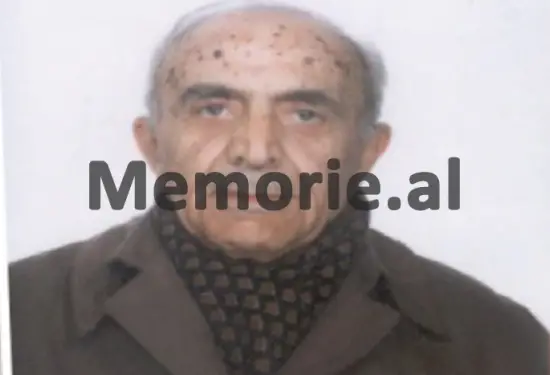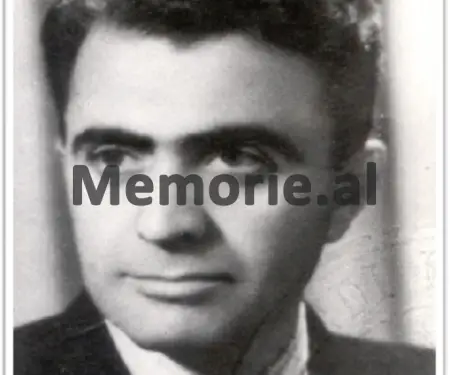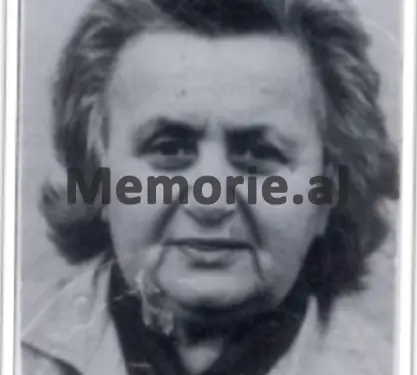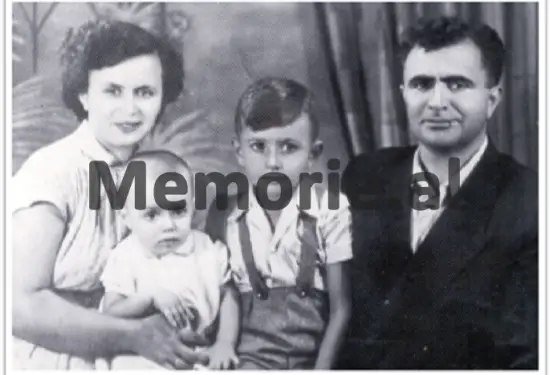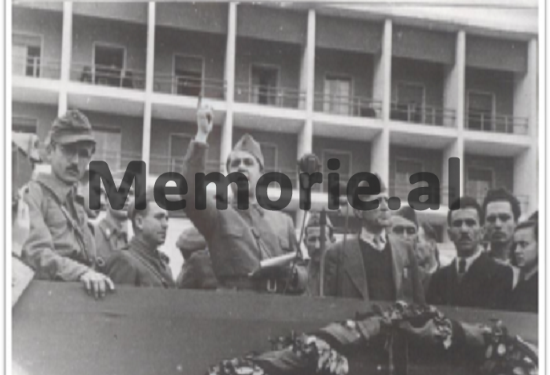Dashnor Kaloçi
Memorie.al publishes the unknown story of the communist dissident, former member of the People’s Assembly, Xhavit Qesja, who in 1956 when he was a student of Philosophy in Moscow, supported Khrushchev’s policy by opposing the communist leadership of Tirana. Why did he not agree to apologize to Enver Hoxha, and the exile of the island of Zvërnec and then to Burrel prison where he went on a 70-day hunger strike?
If Karl Marx were alive and found out that the Albanian communists were tortured to the point of burning their bodies with red-hot iron in the fire and removing their toenails with pliers, as in the case of Christo Budo, then Marx would be uprooted. scalp and would condemn with the utmost severity these act of violence and inhumanity. This is what Xhavit Qesja, who was interned in the Zvërnec Camp, who had been one of the communists, said in one of the 40 letters he sent to the Politburo of the Central Committee of the Albanian Labor Party in the mid-1960s. first of the Kruja district, Commissar of the 23rd Partisan Brigade during the War, Commissar of the Tirana District Command in 1945, member of the Central Committee, deputy and Political Secretary of the Shkodra and Berat District, as well as deputy chairman of the Committee Executive of the District of Elbasan until 1958 when he was arrested accused of being an enemy of the people. But what was the past of Xhavit Qeses, where he had studied and why was he arrested in 1958? Why did they keep Xhavit isolated on the island of Zvërnec, what were his views on the political line followed by Nikita Khrushchev and the Communist Party of the Soviet Union at the time, and why did he oppose the political line of Enver Hoxha? What position did Xhaviti take on the island of Zvërnec, where at that time some of the former high-ranking officials of the ALP were serving their sentences, whom Enver Hoxha had declared enemies and branded as revisionists, and what did he demand in the letters he sent to the Politburo?
Who was Xhavit Qesja?
Xhavit Qesja was born in 1923 in the city of Kruja, where his family is very well known and rich in that city. After finishing the unique school in his hometown, the family sent Xhavit to the gymnasium in Tirana, which he graduated with honors in 1941. Since he was on the benches of that gymnasium, Xhavit first came in contact with communist ideas and together with some of his schoolmates became active in educational groups or sympathizers. of the Communist Party as they were called at the time. After graduating from high school, he worked for a short time in the administration of the Post Office of Tirana and then left that job because the Communist Circle of Tirana led by Gogo Nushi sent him to work in organizing the Party in the district of Kruje.
At the time that Xhavit went to Kruja, thanks to the wide circle of friends he had, he immediately created the first communist cell of that city, being its main leader. Xhavit led the Communist Circle of Kruja for some time and then he was involved in the formation of the partisan gang Kruja-Ishëm together with Rexh Deliu who was appointed its Commander. In 1944, when the 23rd Partisan Brigade was created, Xhavit Qesja was appointed its Commissar and in that position, he took part in all the battles that that partisan formation waged until the end of the War.
During the war, Xhavit was sent by the leaders of the SNP to the Dibra region in order to get in touch with the large Kalosha family and jointly organize further resistance against German forces. From the first years of the War when Xhavit was in the Communist Circle of Tirana, he met a young girl named Meriban Najdeni, who would become his future wife. Meribani was originally from the district of Dibra and her family had come to Tirana in the 1930s.
At the time when Xhaviti met Meribani, she was one of the few communists of the Tirana District and for the great contribution she gave during the War, on November 28, 1944 when the big parade took place in front of the Hotel “Dajti”, where partisan brigades paraded, she was one of the only two partisans who were in that rostrum very close to Enver Hoxha and senior personalities of the SNP leadership of the Democratic Front.
Xhaviti is a deputy and member of the Central Committee of the ALP
Immediately after the end of the war, in the first days of December 1944, Xhavit was appointed Commissar at the Tirana District Command with the rank of major. After staying in that position for several months, from the beginning of 1945 he started working in the apparatus of the Central Committee of the SNP, where in addition to the lectures he gave at the Dako School (Party Course) he made a great contribution to the organization and the functioning of the basic organizations of the Albanian Communist Party in different districts of the country.
In 1947 Xhavit was appointed Political Secretary of the Party Circular in the districts of Shkodra and then in Berat where he worked until 1955. In that year Xhavit was sent to study in the Soviet Union in the branch of Philosophy near the School of the Party High School in Moscow, where he was one of the most prepared students as he knew and mastered French, Italian, English and Russian perfectly. Xhaviti studied at that school until the XX Congress of the Communist Party of the Soviet Union was held, and he was one of the Albanian students who unreservedly supported the liberal decisions of that congress and the Khrushchevite spirit that dominated there.
Given that the political line that Nikita Khrushchev was following at the time contradicted the position of Enver Hoxha and the ALP, the grassroots organization and Albanian students studying at that school sharply criticized him for violating the party line. Also at that time, some of Xhavit’s friends were called to the Albanian embassy, such as Iljaz Spahiu and Thoma Deljana, who were studying in the same school with him, and they were severely criticized in the organization of the Embassy Party for the liberal attitude they had towards the views of their friend, Xhavit Qeses, and why they had not criticized him. After that meeting, Xhavit was informed of the order from Tirana, in which it was said that he should stop his studies and return to Albania urgently.
At the time he returned to Tirana, he continued to be a member of the People’s Assembly and during the break of a session, Enver Hoxha himself put his arm around him and advised him to give up his views. But even after that meeting with Enver Hoxha, Xhavit Qesja not only did not change his thoughts and views, but on the contrary he remained faithful to what he had said since the Soviet Union.
10-year isolation in Zvërnec Camp
Based on the stance of Xhavit Qesja, who was completely at odds with the political line pursued by Enver Hoxha and the ALP at the time, he was removed from Tirana and sent to the position of Deputy Chairman of the Executive Committee of the Elbasan Region. Even during that time he was in that position, Xhaviti did not change his views regarding the political line of the ALP and as a result of that stay in 1958 he was arrested and sent to exile on the island of Zvërnec (near Vlora ) where at that time some of the former senior officials of the ALP were kept in isolation, whom Enver Hoxha had declared enemies.
Shortly after Xhavit was taken to that camp, his wife Meriban was fired (the Prime Minister’s Office) and was not allowed to go to meet Xhavit in Zvërnec. During the period that Xhavit remained isolated in the Zvërnec camp, he was distinguished as one of the most consistent of all former senior communist officials who were interned there by order of Enver Hoxha, such as Tuk and Filip Jakova, Gjin Marku, Agron Çorati, Mark Ndoja, Zef Mala, Tahir and Muhedin Kadare, Pllumb Dishnica, Kadri Hoxha, Iljaz Ahmeti, Maqo Çomo, Kristo Budo, Vaso Marku, Qamil Disha etc. During that time, although Xhavit was in very difficult living conditions, he implemented with precision and rigor a very strict daily program and regime.
Thanks to his fluent foreign languages, he studied constantly, kept notes on various economic issues, used an English-language magazine on international issues, and had two thick notebooks in which he kept notes on world literature. Likewise, during the years he spent in that internment camp, Xhaviti was involved in translating Marx’s “Capital”, a book published in Albanian by the Institute of Marxist-Leninist Studies, without naming the translator.
Xhavit was very sensitive to the injustices and sufferings of his comrades in that camp and, unable to handle them, he constantly wrote letters to the Politburo. In one of those letters, in which he denounced the violence and inhuman tortures inflicted on his comrades, he wrote, among other things: fire and the removal of toenails with pliers, as in the case of Christo Budo, he (Marx) would pull out the hair of the head and condemn with the utmost severity these acts of violence and inhumanity.
In another letter that Xhavit sent to the Politburo at the time that the ALP gave the orientation (order) for the demolition and destruction of churches, mosques and other places of worship, among other things he wrote: “You made a very “You can destroy mosques, churches and other religious places of worship, but you will never be able to stop them by decree and coercion, their human feelings, their conscience, their conscience and their beliefs inherited over the centuries.” During the time that Xhavit was interned in Zvërnec, he was among the only ones who never agreed to take part in the voting.
Xhaviti stated before the Zvërnec Camp Command that he did not take part in the elections because he did not agree with the program of the Democratic Front and the line of the Party that led it. Seeing Xhavit’s position, in 1966 he was arrested and taken to court where he refused to speak and answer questions. His only response was: “I have nothing to do with the trial. “I have told my cases to the Party and only it can consider them and not the court.” After that, Xhavit was sentenced to ten years in political prison and taken from Zvërnec to Burrel prison.
70 days on hunger strike in Burrell Prison
During Xhavit’s nearly 30-year stay on both Zvërnec Island and Burrel Prison, he repeatedly went on hunger strike, urging prison authorities to abide by the rules they had devised. In the early 60’s, when Xhavit was in Zvërnec, he learned that he had received a package of books from Italy (“Dante’s Divine Comedy” etc.) which had been sent to him by his cousin Xhemal Ferra, or as Count Ferra was otherwise known. Security people did not want to give him the books, although “Divine Comedy” was not banned and sold freely in bookstores. Xhavit reacted immediately to the injustice being done to him and informed the command that if the books were not given to him within five days, he would go on a hunger strike.
After five days the books were not given to him and Xhavit declared a hunger strike and refused to take the food given to him by the Camp Command. That strike lasted for eight days and Xhavit did not put anything in his mouth. All his friends stood by him and tried to wet his lips with water as they waited for his death from moment to moment. On the eighth day when the Security saw that he was dying, for fear that they might be held responsible, they were forced to give him the books, as they saw that they could not bring him to his knees.
During the 30 years that Xhavit spent in prisons and internments, he went on a 70-day hunger strike demanding that the command authorities enforce the laws that the communist regime of Enver Hoxha had drafted itself. Given Xhavit’s consistent stance while serving his sentence, he was often subjected to the most inhumane torture. In this regard, Dr. Miço Konomi testified: “One day I was called to the dungeons of the New Prison of Tirana to visit a sick person. When I entered his cell, I saw him lying on the ground half dead and not moving any of his limbs.
When I asked him his name, he replied in a low voice: I am Xhavit Qesja. “When I saw him in what condition he was in, I told the commanders that I had nothing to do with him, as half of his head was pus and he had to be taken to hospital urgently.”
He was released in 1991, after 30 years in prison and exile
After spending 30 years in prison and internment, in the 1990s, when UN Secretary-General Perez de Cuellar was expected to visit Albania, Xhavit Qesen was released from prison when he was 67 years old. -year. At that time, he joined his wife, Meribani, who, forced by the class war, had made a formal separation with him in order to educate the children.
Although in poor health from the suffering, torture and hunger strikes that Xhavit had developed during his years in prison, he still found strength and went constantly to the National Library where he studied for hours. Some of his prison friends, who knew what he had removed, often suggested that he write the memoirs, but he replied:
“I do not fight with the dead; I have submitted my views to the Politburo in letters and to Enver Hoxha himself since he was alive.” Xhavit passed away in 1994, after fulfilling his only pledge: meeting his son, Salvation, after 30 years. In the memory of all his friends, former convicts, etc., Xhavit Qesja has remained as one of the most consistent communist dissidents in his views and who never knelt before the pressures and inhuman tortures that were inflicted on him for 30 years. /Memorie.al




